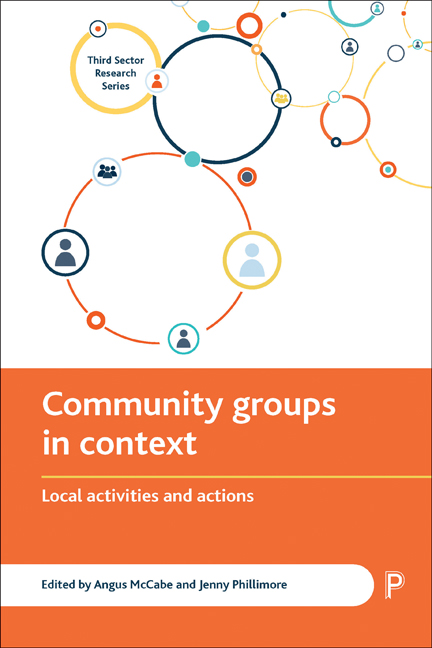Book contents
- Frontmatter
- Contents
- List of tables and figures
- Foreword
- Series editor’s foreword
- Acknowledgements
- Notes on contributors
- Introduction Why get below the radar? The importance of understanding community groups and activities
- Part One Scoping and mapping community actions and activities
- Part Two Community groups and activities in context
- Part Three Under-explored radars
- Part Four Thinking about voice, learning and emotion below the radar
- Index
twelve - Learning to sustain social action
Published online by Cambridge University Press: 05 April 2022
- Frontmatter
- Contents
- List of tables and figures
- Foreword
- Series editor’s foreword
- Acknowledgements
- Notes on contributors
- Introduction Why get below the radar? The importance of understanding community groups and activities
- Part One Scoping and mapping community actions and activities
- Part Two Community groups and activities in context
- Part Three Under-explored radars
- Part Four Thinking about voice, learning and emotion below the radar
- Index
Summary
Chapter aims
This chapter aims to explore:
• how people learn for, and through, community activism;
• the role of social networks and capacity building in community learning;
• changing learning needs in evolving community groups and how those needs are met.
Context: from social capital to capacity building
Over past decades, the concept of social capital (Coleman, 1988; Putnam, 2000) has been influential in the development of policy around communities of place, interest and identity. More recently, research into social networks, and how these operate at local level, has also become important in terms of informing approaches to neighbourhood change, behavioural ‘nudge’ and community resilience (Edwards, 2009; Rowson et al, 2010; Cabinet Office, 2011). These concepts have been linked with the idea of capacity building to develop community groups ‘capitals’ (social, economic and in terms of knowledge) to meet local needs. The notion of building capacity within organisations has somewhat fallen from grace and been replaced by terminology such as ‘developing skills and confidence’ (IVAR, 2010) or ‘capabilities’ (Big Lottery Fund, 2011).
Under New Labour administrations, there was significant investment into a range of capacity-building and community engagement initiatives: from ChangeUp, Capacity Builders, Community Empowerment Networks and Take Part to the coalition's Community Organisers Programme and Big Local scheme after the 2010 election. These initiatives coincided with a growing trend towards often rather mechanistic needs analysis toolkits for voluntary and community groups (NCVO, undated), ‘Kitemarks’ and other quality standards, such as Community Matters, Visible Communities, Birmingham Voluntary Service Council's Quality First, and the Charities Evaluation Service's PQASSO Quality Standard. As a result, learning as a political process (Mayo and Thompson, 1995) has, in the voluntary sector, been overtaken by concepts of competencies and vocationalism (Foley, 1999).
A series of reports have highlighted some of the difficulties of, and tensions within, these capacity-building initiatives. For example, programmes lacked base-lines against which to measure ‘built capacity’ (NAO, 2009; TSRC, 2009). The focus of evaluations has tended to be the perceived quality of delivery (of training, advice etc.) rather than impact and outcomes in the longer term (Sender et al, 2011; Take Part Network, 2011). Where good practice and related guidance has been produced, it has tended to define community organisations as smaller, formal, voluntary groups with paid staff (Kail et al, 2011) or multi-purpose community anchors (IVAR, 2011) with incomes of up to £1 million per year and a (hierarchical) management structure.
- Type
- Chapter
- Information
- Community Groups in ContextLocal Activities and Actions, pp. 241 - 262Publisher: Bristol University PressPrint publication year: 2017



